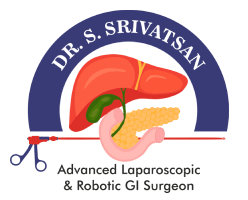
- 21/12/2024
- Dr. Srivatsan Gurumurthy
- 0 Comments
- Blog
How is dyssynergic defecation managed and treated?
Dyssynergic defecation is a condition where a person experiences difficulty in coordinating the muscles required for a bowel movement. It often leads to chronic constipation and a feeling of incomplete evacuation. This condition is relatively common but can significantly impact one’s quality of life. Understanding how it is managed and treated can help individuals make informed decisions and find relief.
What is Dyssynergic Defecation?
Dyssynergic defecation occurs when there is an abnormality in the pelvic floor muscles or the coordination between the muscles involved in the process of defecation. Normally, when you have a bowel movement, the rectum and anus work together to push the stool out. In dyssynergic defecation, there is a lack of coordination, leading to difficulty in emptying the bowels. This condition can lead to chronic constipation, bloating, and discomfort.
The primary cause of dyssynergic defecation is often a dysfunction in the pelvic floor muscles, which may not relax properly during defecation. It can also be due to problems with nerve signals or abnormal patterns of muscle contraction in the rectum and anus.
Symptoms of Dyssynergic Defecation:
Some common symptoms of dyssynergic defecation include:
- Chronic constipation
- Straining during bowel movements
- A sensation of incomplete bowel evacuation
- Abdominal discomfort or bloating
- Feeling like you have to use excessive force to pass stool
- Pain during defecation
Diagnosis of Dyssynergic Defecation:
Diagnosing dyssynergic defecation requires a thorough evaluation by a specialist. Dr. Srivatsan Gurumurthy, a renowned Colorectal Surgeon in Chennai, emphasizes the importance of a detailed history, clinical examination, and specialized diagnostic tests.
The following diagnostic methods are commonly used to diagnose dyssynergic defecation:
- Anorectal Manometry: This test measures the pressure in the rectum and anal sphincter muscles while trying to defecate. It helps determine if the muscles are functioning properly.
- Defecography: This imaging test provides detailed images of the rectum and anus while a person is trying to have a bowel movement, allowing the doctor to observe muscle coordination.
- Pelvic Floor Electromyography (EMG): This test helps measure the electrical activity in the pelvic floor muscles, showing how they respond during bowel movements.
- Colonoscopy or Sigmoidoscopy: These procedures may be used to rule out other causes of constipation, such as tumors, polyps, or inflammation.
Treatment Options for Dyssynergic Defecation:
The treatment for dyssynergic defecation depends on the severity of the condition, the underlying cause, and the individual’s response to different therapies. The aim of treatment is to improve coordination of the pelvic floor muscles and restore normal bowel function.
- Biofeedback Therapy: Biofeedback therapy is one of the most effective treatments for dyssynergic defecation. Dr. Srivatsan Gurumurthy recommends this non-invasive therapy to retrain the pelvic floor muscles and teach patients how to relax the muscles during defecation. During biofeedback therapy, patients are guided to use visual or auditory signals to help them understand how their muscles should function during bowel movements.
- Pelvic Floor Exercises: Pelvic floor exercises (also called Kegel exercises) are designed to strengthen and relax the muscles in the pelvic area. These exercises can improve muscle coordination and support better bowel movements. Dr. Srivatsan Gurumurthy often recommends these exercises as part of a comprehensive treatment plan.
- Dietary Modifications: Diet plays a crucial role in bowel health. A high-fiber diet can soften stool and make it easier to pass, reducing the strain during defecation. Dr. Srivatsan Gurumurthy advises his patients to include more fiber-rich foods like fruits, vegetables, and whole grains in their diet to help with constipation. Additionally, staying well-hydrated is essential for optimal bowel function.
- Medications: In some cases, medications may be prescribed to help manage constipation associated with dyssynergic defecation. Laxatives or stool softeners may be recommended temporarily to ease bowel movements, but these should be used cautiously and under the guidance of a doctor.
- Surgical Intervention: In rare cases, if conservative treatments fail and symptoms remain severe, surgical interventions may be considered. Surgical options are typically reserved for patients with structural issues or underlying conditions that do not respond to non-surgical treatments.
Why Choose Dr. Srivatsan Gurumurthy for Treatment of Dyssynergic Defecation?
- Experienced Colorectal Surgeon: Srivatsan Gurumurthy is a renowned Colorectal Surgeon with extensive experience in treating complex gastrointestinal and colorectal conditions, including dyssynergic defecation.
- Expert in Non-Surgical Treatments: Srivatsan Gurumurthy specializes in biofeedback therapy and other non-surgical treatment options for dyssynergic defecation. He is dedicated to providing the best possible care to his patients using the latest advancements in medical technology.
- Personalized Care: Srivatsan Gurumurthy tailors each treatment plan to the individual needs of the patient, ensuring the best outcomes for those suffering from dyssynergic defecation.
- State-of-the-Art Facilities: Treatment is provided at GEM Hospital, Chennai, and SS Surgical Clinic, equipped with the latest diagnostic tools and treatment modalities to offer comprehensive care.
- Comprehensive Approach: Srivatsan Gurumurthy adopts a holistic approach to treatment, addressing both the physical and lifestyle factors that may be contributing to the condition.
- Proven Track Record: With years of experience in treating patients with colorectal disorders, Dr. Srivatsan Gurumurthy has a proven track record of success in helping patients regain normal bowel function.
Consult Dr. Srivatsan Gurumurthy Today:
If you or someone you know is struggling with dyssynergic defecation or other gastrointestinal issues, Dr. Srivatsan Gurumurthy can help. He offers expert diagnosis and treatment for a wide range of colorectal conditions at GEM Hospital, Chennai, and SS Surgical Clinic.
If you have any questions or need personalized care, consult Dr. Srivatsan Gurumurthy today. He is dedicated to providing the best possible care and helping you regain your quality of life.
Conclusion:
Dyssynergic defecation is a manageable condition when diagnosed and treated appropriately. With the right treatment plan, individuals can improve their bowel function and enjoy a healthier, more comfortable life. Dr. Srivatsan Gurumurthy, a leading Colorectal Surgeon in Chennai, is committed to providing high-quality care and personalized solutions to help patients overcome this condition. If you or a loved one is experiencing symptoms of dyssynergic defecation, don’t hesitate to reach out to Dr. Srivatsan Gurumurthy for expert treatment. Visit GEM Hospital, Chennai, or SS Surgical Clinic today to get the care you deserve.
